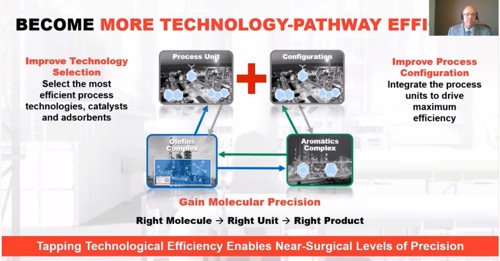IRPC Process '21: Use IOS to produce more olefins with less feed
By Adrienne Blume, Executive Editor
Stan Carp, Senior Manager—IPS Configurations and Process Consultancy for Honeywell UOP, presented on Day 2 of IRPC Process about realizing enhanced, world-scale olefins production with half of the feed traditionally required.
Over the next decade, global petrochemicals demand is expected to grow at about 3%/year, Carp explained. However, around 2031/2032, global demand for petroleum-based fuels, such as gasoline and diesel, is expected to start declining, which leaves a gap of outstanding crude oil demand. New investments will be needed.
"Some of this demand can be met with enhanced molecular management—doing more with less," Carp explained. "The conventional model is shifting to integrated refining and petrochemical operations, with China and the Middle East leading the way. Integrated operations are producing greater than 50% petrochemicals, going as high as 80% with zero fuels."
Carp explained that feedstock efficiency can be reached by selecting the best catalysts and process technologies. Another way is process integration, by which individual process units are connected to ensure that energy and intermediates are used in the best way possible. A third, less-explored approach is molecular management—a proactive design of an integrated complex to direct the feed molecules to the process units in which they can create the maximum value.

Honeywell UOP's six efficiency metrics to drive value through molecular precision include:
- Carbon (putting the right molecules in the right places)
- Utilities (doing more with less)
- Water (treated as a scarce resource)
- Emissions (providing for a greener tomorrow)
- Hydrogen (optimizing the sources and uses)
- Capital (driving for the most bankable project).
Carp discussed yields, total product values and efficiencies from a steam cracker versus an Oleflex unit. He gave an example of the addition of Honeywell UOP's Integrated Olefins Suite (IOS) to a mixed-feed steam cracker, which increases ethylene production and improves return.
The IOS, as part of an alternative "refinery of the future" configuration, can improve petrochemicals yield by 22.5% and reduce the crude rate from that of a basic refinery scheme by 51.25%. This also leads to a drastic reduction in CO2 emissions, Carp explained.
IRPC Process runs from June 2–3 and on demand for one year after the event. To view the entirety of Stan Carp's presentation, please visit the IRPC Process event page to view the event agenda and register for live and on-demand access to all speaker presentations.






Comments